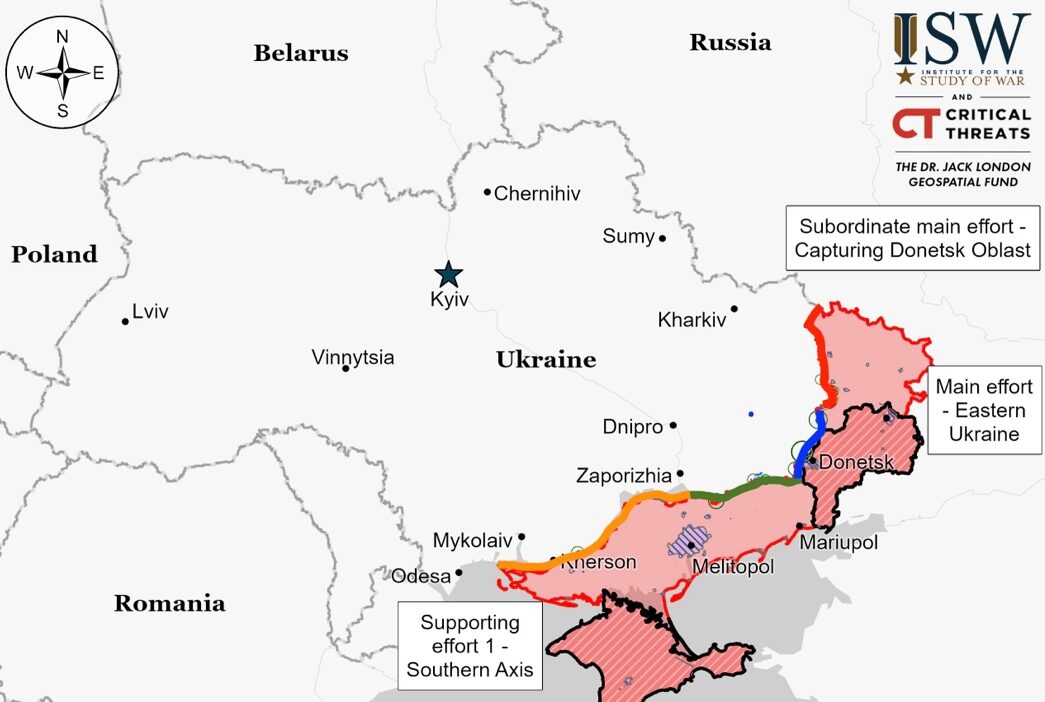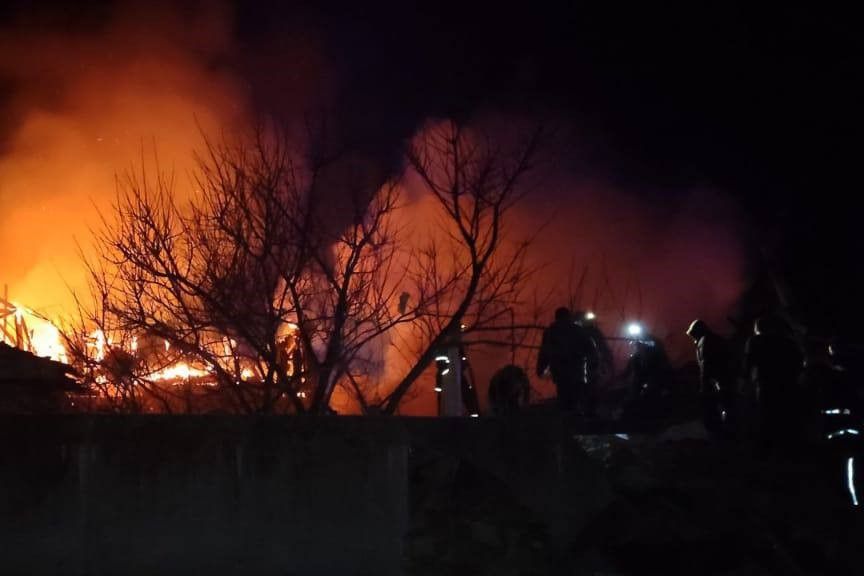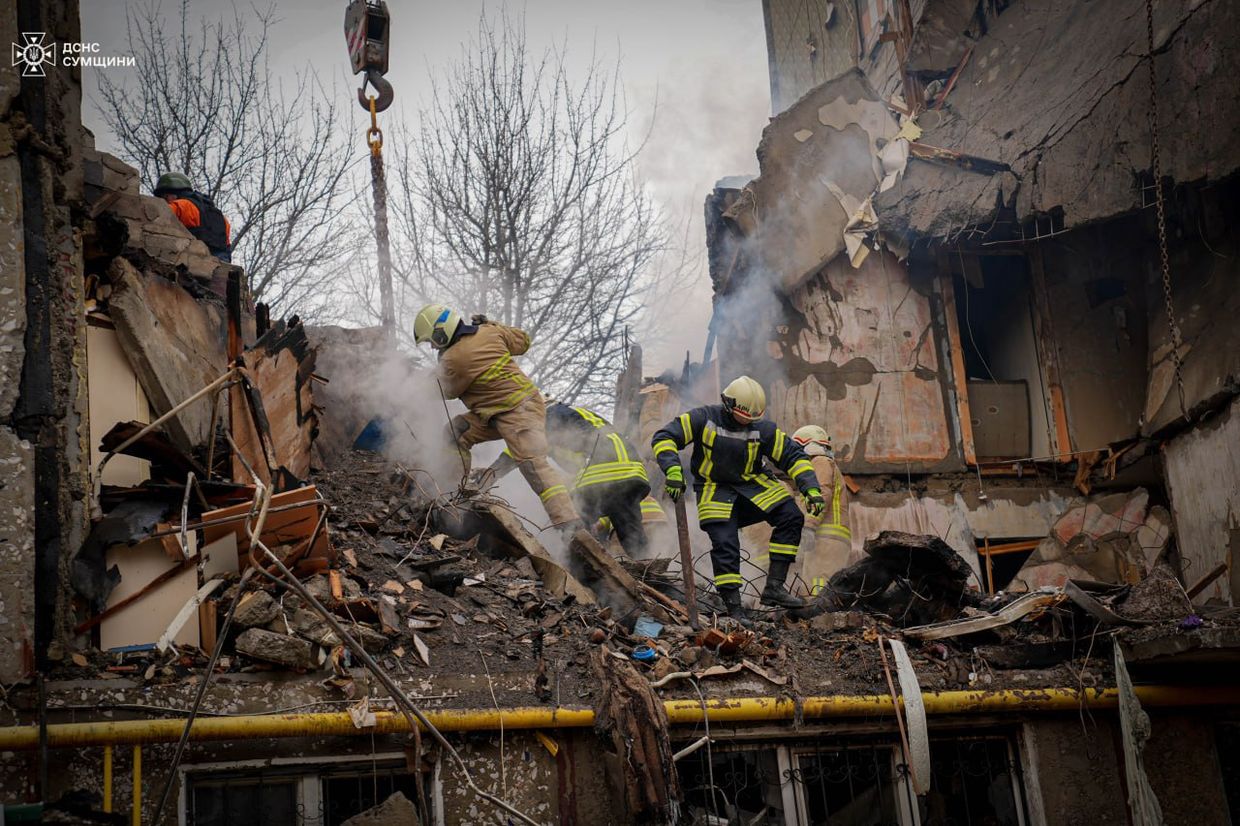Summary of the day: Russian Deputy Chairperson Dmitry Medvedev reiterated calls for Ukraine’s dissolution, reflecting the Kremlin’s non-negotiable stance on Ukraine’s surrender. Ukrainian forces are rotating troops at the frontline, while Russia possibly redirects reserves to intensify eastern offensives, with Western aid crucial to Ukraine’s resistance. The UK suspects Russian jamming against a British official’s aircraft, and Russia faces strategic choices due to Ukrainian raids. Russian regional governments are boosting economic enticements for military volunteers amid advances in Avdiivka and western Zaporizhia.
What Can I Do To Help Ukraine? This is a question I receive all the time. We at Transform Ukraine are building longer-term housing for internally displaced Ukrainians. Visit Rebuild Ukraine for how you can assist in housing a Ukrainian family displaced by the war.
Situation On The Ground And Air
Ukraine’s military command has begun rotating troops at the frontlines, swapping long-deployed units with fresh forces. This move aims to maintain the front’s stability without revealing specific locations for security reasons. This suggests confidence in the frontline’s current stability to manage such rotations effectively.
Russia is reinforcing its military efforts in eastern Ukraine, including near Bakhmut and Donetsk, by deploying reserves. These movements aim to prevent Ukrainian stabilization of the front and potentially enable a breakthrough, although they’re not deemed sufficient for a decisive victory. Despite the reinforcements, Russian forces have not shown the ability to rapidly conquer significant territory.
Russia is reallocating its military reserves to different frontline areas, indicating flexibility in its offensive strategy. The movement of tank and motorized rifle units to new positions suggests a shift in focus and the possibility of future intensified attacks in chosen regions. These changes show Russia’s capacity for strategic adjustments on the battlefield.
The success of Russian military advances in Ukraine heavily relies on Western aid to Ukraine. Slow Russian progress could be misleading, as Ukrainian defenses might weaken without consistent Western support. Adequate assistance from the West is crucial for Ukraine to maintain its current positions, especially as both sides face maneuverability challenges in the spring conditions. Russian offensives continue in an attempt to capitalize on any Ukrainian vulnerabilities before more aid arrives, with future operations potentially influenced by this support.
Russian defenses are repelling limited incursions from Ukrainian groups into border areas, prompting debate on whether to focus resources on these border skirmishes or on larger operations in Ukraine. The situation is causing criticism within Russia, with calls for strategic changes to push the frontlines further into Ukrainian territory to prevent such raids.
The Kremlin faces a dilemma between reputational damage and resource allocation due to its inability to prevent Ukrainian border incursions. Criticism peaked in 2023 after attacks in Belgorod Oblast, leading to a crackdown on dissent within Russia. This has somewhat tempered public criticism from Russian military bloggers, who now focus more on external threats rather than blaming Russian military leadership.
The Russian National Guard reported defending against an assault in Kursk Oblast, attributed to “sabotage groups.” This incident is part of wider hostilities involving anti-Kremlin militias like the Freedom of Russia Legion and the Siberian Battalion, which have launched cross-border operations into Russia. Amid these actions, the militias have called for civilian evacuations in affected regions and announced ongoing liberation efforts against Putin’s regime, emphasizing their independence from Ukrainian command. Claims and counterclaims about control and attacks in border villages have surfaced, with the situation remaining fluid and verification challenging.
Belgorod faced multiple strikes, with local authorities attributing the attacks to Ukraine amidst reports of skirmishes involving an anti-Kremlin militia. The incidents caused damage to residential areas, institutions, and vehicles, resulting in injuries and two fatalities. The governor advised residents to limit travel for safety. Verification of these reports by external sources remains unconfirmed.

Luhansk Front – Initiative Russia
Donetsk Front – Initiative Russia
Zaporizhia Front – Initiative Russia
Kherson (Dnipro River) Front – Initiative Russia
Fighting persisted along the Kupyansk-Svatove-Kreminna line with no shifts in the frontline. Engagements occurred in several locations, but Russian claims of successful arson attacks and Ukrainian retreats lack evidence. Russian forces have resumed offensives in areas southwest of Kreminna, with notable troop movements suggesting strategic redeployments.
Near Bakhmut, ongoing positional battles were reported without any changes to the frontline. Fights occurred in areas surrounding Bakhmut, including northwest, west, southwest, and south of the city, as well as northeast towards Verkhnokamyanske.
Russian forces made advances in Berdychi, northwest of Avdiivka, with ongoing positional fights in the area. Visual evidence shows progress along specific streets in Berdychi, while claims of advancement in Pervomaiske lack confirmation. Reports indicate continued engagements in several locations around Avdiivka. Despite Russian claims of capturing Nevelske, Ukrainian presence is still reported there.
Positional battles around Donetsk City continued without altering the frontline. There are unverified claims of minor Russian advancements and reports of significant Russian troop concentrations in the Novopavlivka direction. Military engagements persist in areas west and southwest of Donetsk, with specific Russian military units mentioned as active near key locations.
Fighting continued along the Donetsk-Zaporizhia border, with reports of clashes in several areas and Russian forces active near Velyka Novosilka. The intensity of Russian offensives increased in Donetsk and Zaporizhia, leading to 13 combat engagements between Russian and Ukrainian forces, indicating a significant escalation in the conflict zone.
Recent footage indicates Russian forces made gains west of Verbove in Zaporizhia Oblast. Despite a Ukrainian counterattack attempt northwest of Verbove, Russian positions held. Ongoing clashes were reported near Robotyne and Verbove.
Ukrainian forces repelled a Russian reconnaissance raid across the Dnipro River on March 13. The attackers aimed for the west bank near the Antonivsky Bridge but were forced back. Such raids, often using small boats, result in significant Russian losses. Meanwhile, fighting continues along the river’s east bank, with Russian attempts at advancement hindered by Ukrainian defenses including cluster munitions and drones.
Human Cost Of War
In the past 24 hours, Russian attacks on civilian targets resulted in the death of 4 people and injuries to at least 16 others:
- A drone attack in Vinnytsia Oblast resulted in one fatality and at least four injuries. The incident occurred amid regional air raid alerts and movements of Shahed-type drones. Emergency services are responding, and debris clearance is underway. Nearby Khmelnitsky Oblast also experienced explosions.
- A drone attack in Sumy destroyed an apartment building, resulting in three deaths and at least 12 injuries. Rescue efforts continued, revealing all victims post-attack. Additionally, another drone strike targeted civilian infrastructure across Sumy and nearby areas, disrupting local TV and radio services.
 An image from the site of the attack in Vinnytsia Oblast
An image from the site of the attack in Vinnytsia Oblast
 Aftermath of the Russian attack on an apartment building in Sumy
Aftermath of the Russian attack on an apartment building in Sumy
Ukraine’s General Staff reported 970 Russian casualties in the past day.
Ukraine News
Overnight on March 13 to 14, Ukraine intercepted 22 out of 36 Russian Shahed drones aimed at various targets, including communication facilities in Sumy and Kharkiv, and a metallurgical plant in Dnipropetrovsk.
The Security Service of Ukraine detained a Ukrainian man suspected of collaborating with Russian military intelligence to sabotage a railway in Kharkiv Oblast. He allegedly planned to use a homemade explosive to disrupt supply lines to Ukrainian forces. His Russian contacts have been identified, preventing the attack. He is also accused of gathering intelligence on Ukrainian military locations.
The Ukrainian embassy in France protested the inclusion of the Ukrainian film “Shadows of Forgotten Ancestors” in a Russian film festival, calling it cultural appropriation. The festival aimed to honor Russian opposition leader Alexei Navalny. Ukraine is seeking French intervention to correct this misrepresentation, emphasizing the ongoing use of culture in Russian political strategies.
The Korczowa-Krakovets border crossing into Poland is open, contrary to expectations of a blockade resumption by Polish protesters. While other border crossings remain closed, impacting about 1,050 trucks, tensions have risen due to protests against Ukrainian imports and EU policies. The situation has strained Kyiv-Warsaw relations, marked by farmers’ demonstrations in Warsaw.
Ukrainian Mobilization and Defense Industrial Base
Rheinmetall plans to establish at least four factories in Ukraine for producing artillery shells, military vehicles, gunpowder, and anti-aircraft weapons, aiming to bolster Ukrainian defense capabilities amid shortages. This move marks Ukraine as a key partner for Rheinmetall, potentially yielding up to 3 billion euros annually in business. Previous agreements include a joint plant with Ukroboronprom for armored vehicle production and a memorandum to produce artillery shells, highlighting strategic collaborations to enhance Ukraine’s military production infrastructure.
Ukraine’s Allies
President Zelensky and German Chancellor Scholz discussed enhancing political, economic, and defense cooperation, focusing on Ukraine’s defense needs like air defense systems and artillery. Zelensky expressed gratitude for Germany’s support in providing artillery ammunition and discussed EU accession progress. They also prepared for upcoming conferences on Ukraine’s support and restoration, amidst Germany’s Bundestag voting against sending long-range Taurus missiles to Ukraine, citing concerns of escalating involvement in the conflict.
The German Bundestag voted against sending Taurus missiles to Ukraine, marking the third such decision despite Ukraine’s request. The vote saw a significant majority opposing the motion, with support from the opposition CDU/CSU. This decision continues the debate within Germany about military support for Ukraine, contrasting with the UK and France’s provision of similar long-range missiles to Ukraine.
The European Commission is considering a proposal to use 27 billion euros in profits from frozen Russian assets to support Ukraine, aiming for a decision before a key meeting on March 21. Disagreements exist on whether these funds should support Ukraine’s military or aid in reconstruction and humanitarian efforts. The U.S. is also exploring ways to utilize frozen Russian assets for Ukraine, highlighting the urgency of such financial support.
French President Macron has not dismissed the possibility of Western troops in Ukraine but deems it unnecessary now, maintaining options open for future decisions. Macron highlighted the existential nature of the conflict for Europe, stressing the need for determination and warning against Russia’s victory implications. While Kyiv seeks increased arms rather than troops, Macron underscores France’s role in supporting Ukraine without initiating offensive actions.
Speaker Mike Johnson suggested converting Ukraine aid into a loan or lend-lease to benefit U.S. taxpayers. This proposal comes as House Republicans consider their own aid package, potentially differing from the Senate’s $95 billion proposal. Discussions included the REPO Act, aimed at using Russian assets for Ukraine support, amidst efforts by House Democrats to force a vote on Ukraine aid through a discharge petition.
Sweden has pledged €30 million to a Czech-led initiative, aiming to provide Ukraine with artillery ammunition. This contribution supports the procurement of 500,000 155 mm and 300,000 122 mm shells, with the first deliveries expected by June. This effort addresses Ukraine’s urgent ammunition needs amidst delays in U.S. military assistance.
Bulgaria has started shipping 100 armored personnel carriers to Ukraine, overcoming previous delays related to transport cost coverage. The Bulgarian parliament had approved military aid, including these carriers, last December. The first shipment left on March 7, involving significant logistical efforts. Bulgaria’s support for Ukraine has grown, also including the provision of Soviet-era air defense missiles.
Poland will maintain a neutral stance regarding the return of Ukrainian refugees, with Polish Ambassador to Kyiv stating the decision lies with the refugees themselves. Poland, hosting about 1 million Ukrainian refugees, the largest number among countries, emphasizes that the choice to return is up to the individuals concerned. The Polish government’s position reflects a balance between labor market needs and respecting the autonomy of Ukrainian citizens residing in Poland.
To commemorate the second anniversary of the Mariupol Drama Theater bombing, the Ukrainian project DE TY is launching a campaign in the U.S. and Canada to highlight the plight of children affected by the war in Ukraine. The campaign, inspired by a song and aiming to raise global awareness and support for affected children, invites participation in a flash mob and social media outreach. Over 500 children have died, and more than 19,500 have been forcibly deported due to the conflict, with efforts ongoing to return them.
Russia News
The British government suspects that Russia jammed the GPS signal of a UK defense secretary’s jet near Kaliningrad. This incident aligns with a pattern of GPS disruptions in the region, potentially linked to Russian electronic warfare. The motive may be connected to recent UK defense commitments in Poland.
A Russian Mi-8 helicopter crashed in Magadan, killing at least two. It was carrying gold mine workers and crew to Evensk. Engine trouble is suspected, and investigations are underway. This follows a similar incident last month involving an Mi-8.
Russia has expanded its entry ban to include an additional 227 U.S. citizens, accusing them of promoting anti-Russian sentiment and spreading misinformation. This update comes after recently prohibiting entry to 367 individuals from the Baltic states. High-profile U.S. officials and business leaders are among the newly banned, reflecting Russia’s response to the current geopolitical tensions.
Russian Mobilization and Defense Industrial Base
Russian regions are boosting financial incentives to attract military volunteers, with payments for signing up now averaging 225,000 rubles ($2,460). The incentives vary significantly by region, with some areas offering up to 800,000 rubles ($8,744) for enlistment.
Russia’s Allies
Belarus maintains it won’t join Russia’s conflict in Ukraine, emphasizing a lack of interest in the war despite external pressures. This stance aligns with Belarus’ ongoing support for Russia through non-combat means such as military production and sanctions evasion.
Russia has reportedly utilized about 50 North Korean missiles in attacks across six Ukrainian regions, highlighting North Korea as a significant arms supplier to Russia. This includes ballistic missiles and millions of artillery shells. Specific instances, such as a confirmed attack in Kharkiv using North Korean missiles, are under scrutiny for verification. North Korean missiles, noted for their lower quality and technical capabilities compared to Russian counterparts, have had instances of failure mid-air.
Russian Narratives and Propaganda
Dmitry Medvedev has proposed a “peace formula” that would essentially dissolve Ukraine’s sovereignty, demanding its full surrender and integration into Russia. The plan includes several points such as demilitarization, “denazification,” and prohibiting any future Ukrainian state from joining military alliances without Russian approval. These points echo Vladimir Putin’s long-held views on Ukraine and Russia’s historical unity, reinforcing the Kremlin’s stance that real peace involves the end of Ukraine as an independent state.
Russian sources claimed Ukrainian drones targeted the Zaporizhzhia Nuclear Power Plant, with TASS publishing photos of an alleged crater nearby. The plant’s Russian-appointed head stated there was no damage or casualties. These accusations seem aimed at justifying the Russian occupation and disputing Ukraine’s claims to the facility.
Russia is portraying the conflict in Ukraine as a global clash by highlighting foreign volunteers in Ukrainian forces, claiming a presence of mercenaries from various countries. Concurrently, Russia is also reportedly enlisting migrants and foreigners to fight on its side. This narrative aims to internationalize the conflict further.
Putin aims to showcase Russia’s upcoming presidential election as legitimate, emphasizing a free and fair process to validate his expected continuation in office. Claims of external efforts to hinder Russian expatriates from voting are part of narratives suggesting Western attempts to undermine the election’s credibility.
Source Materials
Institute for the Study of War – understandingwar.org
The Kyiv Independent – kyivindependent.com
Kyiv Post – kyivpost.com
